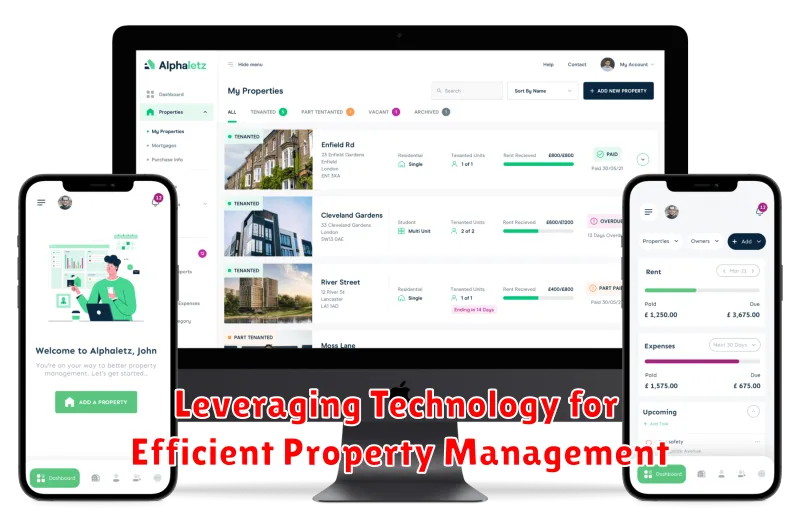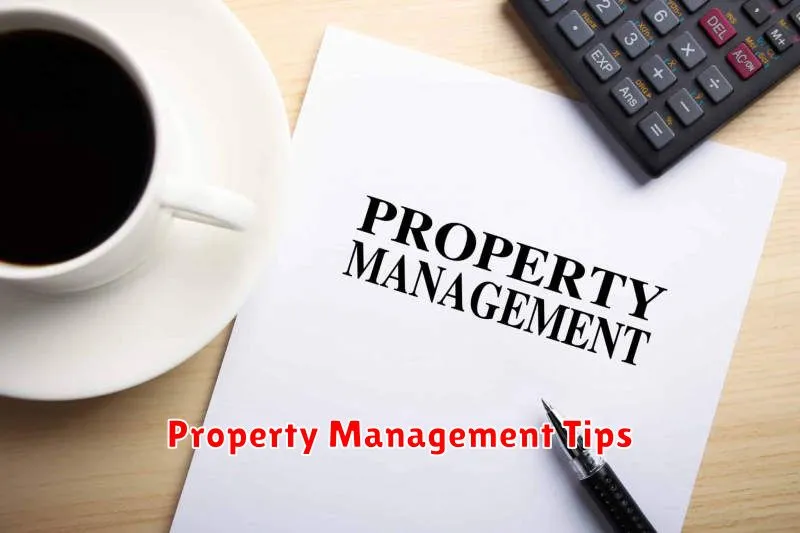Tired of constant headaches and sleepless nights over your rental properties? Imagine a world where your investments bring in consistent, reliable income, freeing you from the burden of day-to-day management. From Headaches to High Returns: Proven Strategies for Successful Property Management explores the secrets to unlocking the full potential of your rental properties, transforming them from stress-inducing liabilities into lucrative assets.
We’ll delve into actionable strategies and proven techniques that empower you to build a thriving property management system. Discover how to attract and retain quality tenants, manage finances effectively, navigate legal complexities, and implement innovative maintenance practices. Whether you’re a seasoned landlord or just starting out, this guide will equip you with the knowledge and tools to achieve long-term success in the property management arena.
Setting Clear Investment Goals and Objectives
Before embarking on any property management journey, establishing clear investment goals and objectives is paramount. These serve as your guiding compass, dictating your strategy, risk tolerance, and overall success.
Ask yourself: What are you aiming to achieve with this property investment? Are you seeking passive income, capital appreciation, or a combination of both? Defining these goals provides a framework for making informed decisions.
Consider factors like your time horizon and desired return on investment. For instance, if you’re looking for quick gains, you might prioritize short-term rentals. But if long-term stability and passive income are your focus, a buy-and-hold strategy with long-term tenants might be more suitable.
Remember, clearly defined goals act as your roadmap. They enable you to measure progress, stay motivated, and make strategic adjustments along the way, ultimately maximizing your chances of success.
Finding and Screening High-Quality Tenants

Finding and screening high-quality tenants is crucial for successful property management. By attracting and selecting reliable and responsible tenants, you can minimize headaches, maximize your returns, and create a positive rental experience for everyone involved.
Here are some key strategies for finding and screening high-quality tenants:
1. Create a Desirable Rental Property
Start by making your property attractive to the right tenants. This involves ensuring it’s well-maintained, clean, and updated. Consider offering modern amenities and upgrades that appeal to your target market.
2. Utilize Effective Marketing Channels
Reach the right audience by using a variety of marketing channels. Explore online platforms like Craigslist, Zillow, and Facebook Marketplace. Consider working with local real estate agents to promote your property.
3. Screen Tenants Thoroughly
Implement a comprehensive screening process to assess each applicant’s qualifications. Check credit scores, employment history, and previous rental references. Perform background checks to ensure the tenant’s safety and reliability.
4. Conduct In-Person Interviews
Meeting potential tenants in person allows you to gauge their personality, communication skills, and overall suitability for your property. Ask open-ended questions about their lifestyle, housing needs, and rental history.
5. Create a Detailed Lease Agreement
Protect yourself and your property with a thorough lease agreement that outlines clear expectations, responsibilities, and consequences for violating the terms. Consult with a legal professional to ensure your lease is legally sound.
By following these strategies, you can increase your chances of finding and screening high-quality tenants who will contribute to the success of your property management endeavors. Remember, investing time and effort in this critical stage will pay off with positive outcomes and less stress in the long run.
Establishing Rent Prices and Security Deposit Amounts
Setting the right rent price and security deposit is crucial for maximizing your rental income and minimizing risks. This process requires careful consideration of market factors and local regulations.
Researching Comparable Properties: Start by researching similar properties in your area. Check online listing websites and consult with local real estate agents to understand the prevailing rental rates for units with comparable size, amenities, and location.
Analyzing Market Conditions: Consider the current market demand for rentals. Is there high vacancy or a shortage of available units? Consider factors like seasonal fluctuations, economic trends, and recent developments in your area that might influence rental rates.
Calculating Operating Expenses: Estimate your annual operating expenses, including property taxes, insurance, maintenance, utilities (if included in rent), and management fees. These costs will influence your profit margin and help determine a reasonable rental rate.
Determining Security Deposit: Security deposits are typically used to cover potential damages to the property. While state laws vary, a standard practice is to charge one or two months’ rent as a security deposit. This amount can be adjusted based on the age and condition of the property and the risk assessment of your tenants.
Negotiating with Tenants: Be prepared to negotiate with potential tenants, particularly in competitive rental markets. Transparency and a clear understanding of your pricing rationale can help foster mutually beneficial agreements.
Creating a Comprehensive Lease Agreement
A comprehensive lease agreement is the cornerstone of successful property management. It outlines the terms and conditions of the rental agreement, safeguarding both the landlord and the tenant. A well-crafted lease agreement minimizes disputes and ensures a smooth rental experience.
Start by including essential details like the property address, rental amount, and lease duration. Clearly define tenant responsibilities, including paying rent on time, maintaining the property, and adhering to noise regulations.
For further protection, incorporate clauses addressing pet policies, smoking restrictions, and guest limitations. Consider including a security deposit provision, outlining its purpose and how it will be returned.
Be thorough in addressing maintenance responsibilities, specifying who handles repairs and under what circumstances. Include a termination clause outlining the notice period and conditions for breaking the lease.
For additional clarity, consider incorporating a dispute resolution process. This outlines the steps for addressing disagreements between landlord and tenant, providing a structured approach for finding a resolution.
Remember, a comprehensive lease agreement is more than just a document; it’s a blueprint for a successful landlord-tenant relationship. By addressing potential issues upfront, you can minimize future conflicts and create a positive experience for both parties.
Effective Communication with Tenants
Effective communication is the cornerstone of a successful landlord-tenant relationship. It fosters trust, reduces misunderstandings, and ultimately leads to a smoother and more profitable property management experience.
Here are some key strategies for effective communication with tenants:
- Establish Clear Communication Channels: Designate a primary mode of contact, whether it’s email, phone, or a dedicated property management platform. Ensure tenants know how to reach you and when they can expect a response.
- Be Prompt and Responsive: Timely communication is crucial. Respond to inquiries, requests, and maintenance issues within a reasonable timeframe. Delays can escalate problems and create frustration.
- Use Professional and Respectful Language: Maintain a courteous tone in all interactions, even when addressing difficult situations. Avoid jargon or slang, and ensure your messages are clear and concise.
- Document Everything: Keep a detailed record of all communications, including dates, times, and the content of the conversation. This documentation can be invaluable in resolving disputes or addressing legal issues.
- Utilize Technology: Take advantage of online platforms, property management software, or tenant portals to streamline communication, automate tasks, and provide 24/7 access to information.
- Encourage Open Dialogue: Create opportunities for feedback and dialogue with tenants. This can help identify areas for improvement and build a positive relationship.
By prioritizing clear and consistent communication, you can transform your tenant relationships from potential headaches to valuable assets, contributing to the overall success of your property management business.
Handling Maintenance Requests Promptly and Professionally
Prompt and professional handling of maintenance requests is crucial for tenant satisfaction and ultimately, property value. Tenants who feel their needs are addressed promptly and efficiently are more likely to renew their lease, pay rent on time, and take care of the property.
Here are some key strategies to ensure maintenance requests are handled effectively:
- Establish a Clear Process: Have a standardized system for receiving, logging, and prioritizing maintenance requests. This could involve an online portal, email system, or dedicated phone line.
- Respond Quickly: Acknowledge receipt of the request within 24 hours, even if it’s just to let the tenant know the issue is being reviewed. This initial response sets the tone for a positive experience.
- Prioritize Urgent Issues: Categorize requests based on urgency (e.g., plumbing leaks, power outages) and address those immediately.
- Communicate Regularly: Keep tenants informed about the status of their requests, including estimated timelines for completion.
- Use Qualified Contractors: Work with reliable and experienced contractors for repairs and maintenance to ensure quality work and minimize future problems.
- Address Concerns Promptly: If a tenant expresses dissatisfaction with the work performed, address their concerns immediately and strive for a resolution.
By implementing these strategies, you can cultivate a positive and proactive approach to maintenance requests, enhancing tenant satisfaction and fostering a strong relationship with your property occupants.
Rent Collection and Late Payment Policies

A well-defined rent collection and late payment policy is crucial for a smooth-running property management business. It provides clarity for both tenants and landlords, ensuring timely payments and minimizing financial losses. A strong policy should be clearly communicated and enforced consistently.
Key components of a successful rent collection policy include:
- Clear Payment Due Date: Specify the exact date rent is due each month, avoiding any ambiguity.
- Multiple Payment Options: Offer convenient payment methods, such as online portals, mobile apps, or physical payment drops, to cater to different tenant preferences.
- Late Fee Structure: Establish clear late fees, including the amount and grace period. Ensure they are legally compliant and fair.
- Communication Protocol: Implement a communication strategy for reminders, late payment notices, and follow-up actions. Consider using email, text messages, or phone calls.
- Eviction Procedures: Outline the steps taken for non-payment of rent, including legal procedures, ensuring you comply with all relevant laws.
By having a robust and well-enforced rent collection and late payment policy, property managers can significantly reduce late payments, manage cash flow effectively, and maintain healthy tenant relationships. Remember, transparency, consistency, and fairness are key to building trust and minimizing disputes.
Property Inspections and Routine Maintenance
Regular property inspections and routine maintenance are the backbone of successful property management. They prevent minor issues from escalating into major headaches and costly repairs, maximizing tenant satisfaction and minimizing unexpected expenses.
A comprehensive inspection schedule should include:
- Move-in inspections to document existing conditions and establish a baseline.
- Regular inspections at least quarterly, or more frequently if necessary, to identify potential issues early.
- Move-out inspections to assess damage and determine the appropriate cleaning deposit.
During these inspections, focus on:
- Appliance functionality: Check that all appliances are working properly and there are no signs of malfunction.
- Plumbing and electrical systems: Look for leaks, faulty wiring, and other potential safety hazards.
- Structural integrity: Inspect for cracks, mold, and other signs of damage.
- Safety features: Ensure fire alarms, smoke detectors, and carbon monoxide detectors are in working order.
- Overall cleanliness and condition: Maintain a clean and well-maintained property to attract and retain tenants.
Implementing a proactive maintenance program involves:
- Responding promptly to tenant requests for repairs.
- Performing preventative maintenance, such as changing air filters or cleaning gutters, to prevent future issues.
- Maintaining accurate records of inspections, repairs, and maintenance tasks.
By investing in regular inspections and routine maintenance, landlords can ensure their properties remain in good condition, minimize costly repairs, and cultivate a positive tenant experience. This ultimately translates to a higher return on investment and a smoother, more successful property management journey.
Understanding Landlord-Tenant Laws and Regulations
Navigating the complex world of property management can feel like a daunting task, but one crucial aspect that can make or break your success is a thorough understanding of landlord-tenant laws and regulations. These laws are designed to protect both landlords and tenants, ensuring fair and transparent rental practices.
Knowing your local laws is essential for creating a safe and legal rental environment. This includes understanding crucial areas like:
- Lease agreements: These are the legally binding contracts outlining the terms of the rental relationship, including rent, security deposits, and tenant responsibilities.
- Eviction procedures: Knowing the proper steps for evicting a tenant for non-payment of rent or lease violations is critical to protect your investment.
- Landlord’s duty to provide habitable housing: You are legally obligated to maintain the property to meet certain standards of safety and habitability, such as working plumbing, electrical, and heating systems.
- Tenant’s rights: Understanding tenant rights, such as the right to privacy and the right to make reasonable modifications for accessibility, helps you avoid legal disputes.
- Rent control laws: In some areas, rent control laws may restrict how much you can increase rent. Being aware of these regulations is crucial for setting fair rental rates.
To stay compliant, consider seeking guidance from a qualified legal professional or consulting reliable resources such as your state’s Department of Housing or local bar association. By understanding the laws and regulations that govern your rental properties, you can confidently navigate the legal landscape and minimize potential headaches, ensuring a more seamless and successful property management experience.
Leveraging Technology for Efficient Property Management

In today’s fast-paced world, property management demands a seamless and efficient approach. Luckily, technology has become an indispensable tool, empowering property managers to streamline operations, enhance communication, and ultimately maximize returns. From tenant screening and lease management to maintenance requests and rent collection, embracing technology can transform the way you manage your properties.
Property Management Software: Invest in comprehensive software solutions that centralize all aspects of your business, from tenant records and financials to maintenance logs and communication channels. These platforms offer automation features, such as automated rent reminders and lease renewals, saving you time and reducing manual errors.
Online Payment Portals: Simplify rent collection and enhance tenant convenience by offering secure online payment options. This streamlines the process for both you and your tenants, minimizing late payments and reducing administrative burdens.
Communication Apps: Stay connected with tenants through dedicated communication apps that facilitate instant messaging, file sharing, and even online surveys. This fosters efficient communication, ensures clear communication channels, and empowers tenants to resolve issues promptly.
Maintenance Management Platforms: Optimize maintenance operations by utilizing platforms that connect you with qualified contractors, track maintenance requests, and schedule repairs efficiently. This eliminates delays, reduces costs, and ensures tenant satisfaction.
Data Analytics Tools: Leverage data analytics to gain valuable insights into your portfolio’s performance. Track key metrics, identify trends, and make data-driven decisions that optimize your strategies and enhance profitability.
By embracing technology, property managers can shift from reactive firefighting to proactive management. This ultimately leads to increased efficiency, improved tenant satisfaction, and higher returns on investment.
Building Strong Relationships with Vendors and Contractors
In property management, building strong relationships with vendors and contractors is crucial for ensuring smooth operations and maximizing returns. A strong network of reliable service providers can help you navigate unexpected issues, maintain property value, and ultimately, enhance tenant satisfaction. Here are some proven strategies to foster these valuable partnerships:
Clear Communication: Start by establishing clear communication channels with your vendors. Communicate your expectations explicitly, be it regarding deadlines, quality standards, or project scope. Regular communication updates, prompt responses, and a collaborative approach build trust and prevent misunderstandings.
Honesty and Transparency: Be upfront about your budget constraints and any potential challenges. Treating vendors fairly and with respect fosters loyalty and encourages them to go the extra mile. Transparency in your dealings creates a foundation of trust and strengthens your working relationship.
Prompt Payment: Timely payments demonstrate professionalism and respect for your vendors. Establish clear payment terms and stick to them. By honoring your commitments, you cultivate a strong reputation that attracts reliable partners.
Value their Expertise: Recognize and appreciate the skills and experience your vendors bring to the table. Seek their input and consider their recommendations, especially for complex projects. Valuing their expertise strengthens your partnership and leads to better outcomes.
Build a Network: Cultivate relationships with a diverse group of vendors, specializing in different areas. This network provides you with options and ensures you have access to the best resources for any given situation. Networking also allows for referrals and valuable industry insights.
By nurturing strong relationships with vendors and contractors, property managers can turn potential headaches into opportunities for success. These partnerships streamline operations, enhance tenant satisfaction, and ultimately contribute to the long-term profitability of your investments.
Analyzing Financial Performance and Tracking Expenses
Effective property management relies heavily on a solid understanding of financial performance and a meticulous approach to tracking expenses. By analyzing your financial data, you gain crucial insights that guide strategic decision-making and ultimately optimize your property’s profitability.
Start by implementing a robust expense tracking system. Utilize software or spreadsheets to meticulously categorize every expenditure, from maintenance costs to utilities and property taxes. This detailed record will provide a clear picture of where your money is going, enabling you to identify areas for potential cost savings.
Regularly analyze your income and expenses. Compare your actual performance against projected budgets, identifying any discrepancies or trends that require attention. This analysis helps you assess the profitability of your properties, pinpoint potential leaks in your financial system, and make informed adjustments to optimize your operations.
Don’t overlook the importance of performance metrics. Track key indicators like occupancy rates, vacancy rates, and average rent per square foot. These metrics provide valuable insights into the overall health and performance of your properties, allowing you to make data-driven decisions that drive profitability.
By diligently tracking your financial performance and expenses, you gain control over your property’s financial health. This data-driven approach empowers you to make informed decisions, minimize unnecessary expenses, and maximize returns on your investment.
Strategies for Tenant Retention and Reducing Vacancies
Vacancies are a landlord’s worst nightmare, leading to lost income and headaches. While it’s impossible to avoid all vacancies, strategic tenant retention and vacancy reduction are key to successful property management.
Here are some proven strategies:
1. Build Strong Tenant Relationships:
- Respond promptly to maintenance requests
- Be fair and transparent in your communication
- Offer lease renewal incentives
2. Create a Desirable Living Experience:
- Invest in property upgrades and maintenance
- Provide amenities that enhance tenant satisfaction
- Offer flexible lease terms
3. Implement Effective Marketing Strategies:
- Highlight property features and benefits
- Use professional photography and virtual tours
- Engage with potential tenants through online platforms
4. Conduct Thorough Screening:
- Ensure you are choosing reliable and responsible tenants
- Verify income and credit history
- Conduct background checks
5. Utilize Technology:
- Automate rent collection and communication
- Use tenant portals for easy communication
- Analyze data to identify areas for improvement
By implementing these strategies, property managers can significantly reduce vacancy rates, improve tenant satisfaction, and increase their overall returns.

